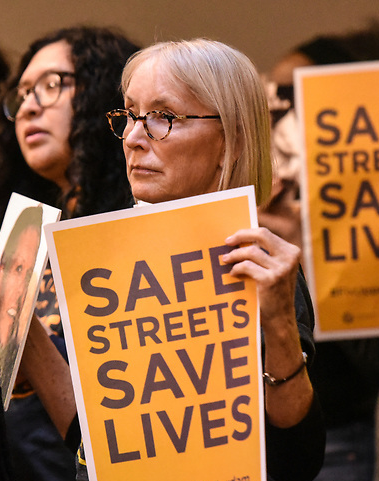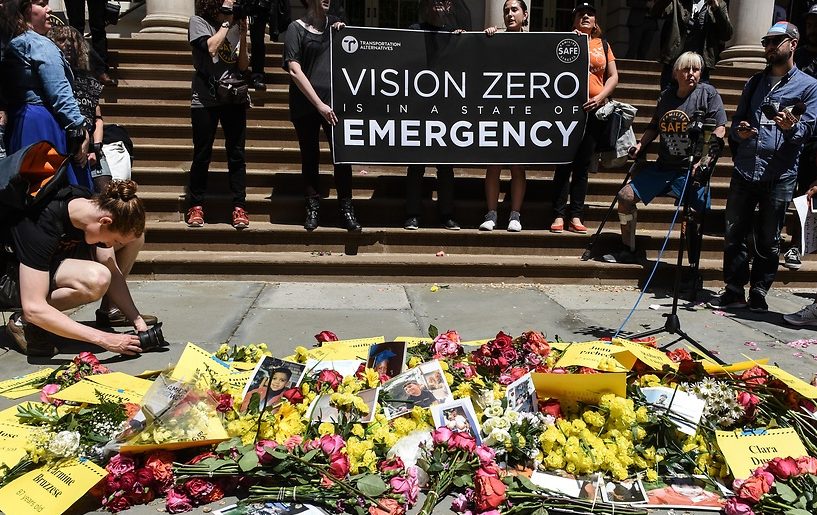Mayor de Blasio declared a public-health emergency this spring when the number of cases of measles in New York City reached 280. He needs to do the same thing for traffic deaths.
New York’s health code states that a public-health emergency occurs when “urgent public-health action is necessary to protect the public health against imminent or existing threat.”
Yet, with de Blasio’s vaunted Vision Zero initiative well into its sixth year, the mayor doesn’t seem to see the urgency in the spike this year in the number of deaths caused by reckless drivers and other vehicle violence: Cars have killed 80 New Yorkers in 2019 as of this writing.
That’s why Families for Safe Streets is calling on de Blasio to declare traffic violence a public-health emergency — just like measles — and to devote the full panoply of emergency resources to the crisis.
The first step: the mayor needs to show New Yorkers that he’s serious about public safety and sign the Vision Zero Street Design Standard bill, which will help to remove politics from the process of designing safer streets.

The mayor, who often seems to view the world through a windshield, needs to wake up and see the carnage.
Last month, drivers ran down four senior citizens who were crossing streets. And to date drivers have killed 10 cyclists — as many as died in all of 2018.
Does that not sound like an imminent and existing danger?
On average, a New Yorker is killed in a traffic crash every 40 hours, and each year, more than 4,000 New Yorkers sustain life-altering injuries because of vehicle violence. Although those numbers have fallen over the first five years of Vision Zero, but this recent increase in deaths is a grave cause of concern.
The dramatic rise in measles — a disease supposedly eliminated two decades ago — raised alarms. But what about the deadly danger from cars that we live with every day?
Like an insidious virus, traffic violence picks us off one by one. But because we cover it under the bland language of “accidents,” we ignore its deadly consequences — and don’t fear it enough.
Traffic violence is at once devastating and surreptitious, making headlines only when it takes the life of someone who is rich or famous. It thrives on the growth of our car culture and the failures of our transit system.
I’ve learned a few things about traffic deaths. My husband Dr. Carl Henry Nacht was a physician who practiced preventive medicine. Ever since I watched a reckless tow-truck driver take his life 13 years ago, I have made it my business to prevent further death on our streets.
As safe-streets advocate, I am constantly amazed at just how many New Yorkers remain blasé about the serial killer hiding in plain sight. Unfortunately, some of those blasé New Yorkers represent us in government.
We know that measles can be prevented with two doses of the MMR vaccine. No vaccine can immunize us from reckless drivers. But there are data-driven methods to prevent speeding, failure to yield, and distracted driving.
What’s missing is the political will necessary for dedicating the proper resources to eradicating this public-health emergency.
Instead, we get an ineffective, piecemeal approach. Neighborhoods lack life-saving street redesigns because a handful of politically appointed community-board members prioritize the preservation of free parking spots over our lives. Vision Zero — which promised to eradicate traffic deaths — looks as if it’s on life support.
Our elected leaders and public-health departments must take seriously the rising threat of death-by-traffic and administer “urgent public-health action.”
We must raise the consciousness of all New Yorkers to the health crisis on our streets — and turn our forbidding streets into forgiving ones.
The families who have lost the most have carried this burden, but only together will we create a truly livable city with livable streets.
Attention, indeed, must be paid.
Mary Beth Kelly is a co-founder of Families for Safe Streets.






